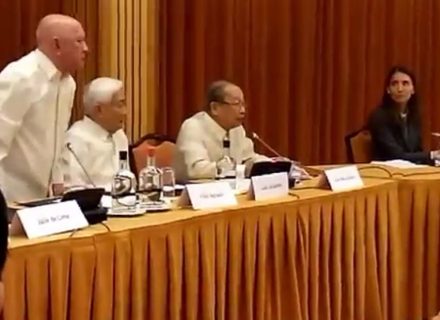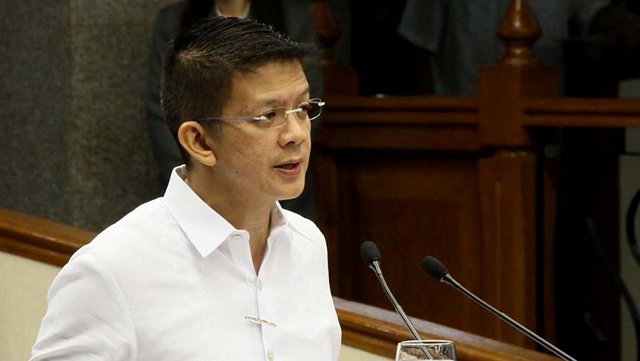
(Eagle News) – The fourth round of formal peace talks opened on Monday, April 3, in the Hague, The Netherlands where both panels from the Philippine government and the National Democratic Front of the Philippines spoke positively of having a bilateral ceasefire agreement signed soon.
No less than the NDFP chief consultant, Communist Party of the Philippines founding chair Jose Maria Sison thanked President Rodrigo Duterte for “being gracious” in allowing the members of the GRP panel to back channel talks on March 10 and 11 to iron out kinks in the talks. He also thanked Duterte, who was his former student, for allowing the government negotiatiors to be at the fourth round of the formal talks’ opening.
Sison, who had just recovered from a month-long illness, said the NDFP is desirous to have a signed bilateral ceasefire agreement as soon as possible.
“The NDF is most interested as soon as possible with an agreement or memorandum of understanding to focus on this interim bilateral agreement pending the forging of a single joint ceasefire agreement co-signed by the conflicting parties,” Sison said during the opening ceremonies of the fourth round of talks between the Philippine government and the NDF.
He said this “joint ceasefire agreement, more elaborate and more stable than the interim bilateral ceasefire agreement can be done.”
-Optimistic for a ceasefire deal
“I continue to be optimistic that within this year, it is possible for the GRP and the NDFP negotiating panels to sign a Comprehensive agreement on social and economic reforms (CASER), and the consequent ceasefire agreement,” he added.
President Rodrigo Duterte earlier reiterated his four conditions for the continuation of peace talks with the National Democratic Front (NDF), including agreed terms of reference for a bilateral ceasefire agreement with the communists.
The formal opening of the fourth round of the talks between the Philippine government and the NDF started Monday 10 a.m. (4 pm Manila time) in the Hague, the Netherlands, delayed from the earlier schedule of Sunday.
Helene Revhaug, spokeswoman for the Norwegian Centre for Conflict Resolution (NOREF), mediating the planned discussions, announced the delay in the formal opening from Sunday to Monday.
The talks are the fourth round to date between Manila and the National Democratic Front. Discussions have been on-off for 30 years but were restarted by President Rodrigo Duterte after he took office last June.
The insurgency began in 1968 in the poverty-stricken country and has claimed an estimated 30,000 lives according to the military.
President Duterte’s four conditions
Duterte’s four conditions are the following:
– that there should be clear parameters or terms of reference for the bilateral ceasefire which should be in writing;
– that the government shall not recognize any territory claimed by the NDF or the communists and the New People’s Army (NPA);
– that the Communist Party of the Philippines-NPA-NDF should stop collecting revolutionary taxes and from its extortion, extraction and arson activities; and that
– the CPP-NPA-NDF should release all its prisoners, including policemen, soldiers and civilians.
“This fight has been going on for the last 50 years. I hate it,” the President said Sunday, April 2, when he came to the Camp Evangelista Station Hospital (CESH) in the 4th Infantry Division (4ID) of Camp BGen. Edilberto Evangelista, Cagayan de Oro City. He went there to visit army soldiers wounded in the latest clashes with the NPA rebels in Misamis Oriental and Bukidnon.
Duterte arrived on Sunday afternoon to award Purple Hearts medals to ten wounded Army soldiers.
Presidential Adviser on the Peace Process Jesus Dureza said President Duterte called them up a few minutes before the formal opening of the fourth round of the talks on Monday.
He then relayed during the formal talks’ opening President Duterte’s “personal greetings” regarding the peace talks.
The fourth round of talks between the Philippine government and the NDFP was supposed to start Sunday morning in The Netherlands, but the opening was moved to Monday.
-Dureza sees successful peace talks
During his opening speech, Dureza said that at this point of the talks, the two panels are already “sharing common values” and “common aspirations,” having gone past the phase of merely negotiating.
He said this was why he is very positive that the peace talks would be successful.
“We’re now very confident that we’ll be able to move dramatically from where we have been and from where we are in our work to have peace in the land,” Dureza said.
“This is the farthest point that we’ve already achieved in our negotiations with the CPP-NDF,” he said citing the fourth round of talks.
“And I am seeing and noticing that we are no longer in the concept of negotiating, but are already sharing common values and common aspirations for a better Philippines. And I think this is the one that will bring us further towards what we all dream of — of having a better Philippines,” Dureza added.
The presidential peace adviser recognized that there had been hurdles in the peace process which had been stalled for a time because of violence and fighting when there was still supposedly a ceasefire in place last February.
But he said these are just part of the challenges that would be discussed in this round of talks as they discuss a bilateral ceasefire agreement.
“There will be some challenges along the way. As we say always, the road to peace is not a paved road,” Dureza said.
“There will humps and bumps along the way. But we always say let us all together stay the course,” he added.







